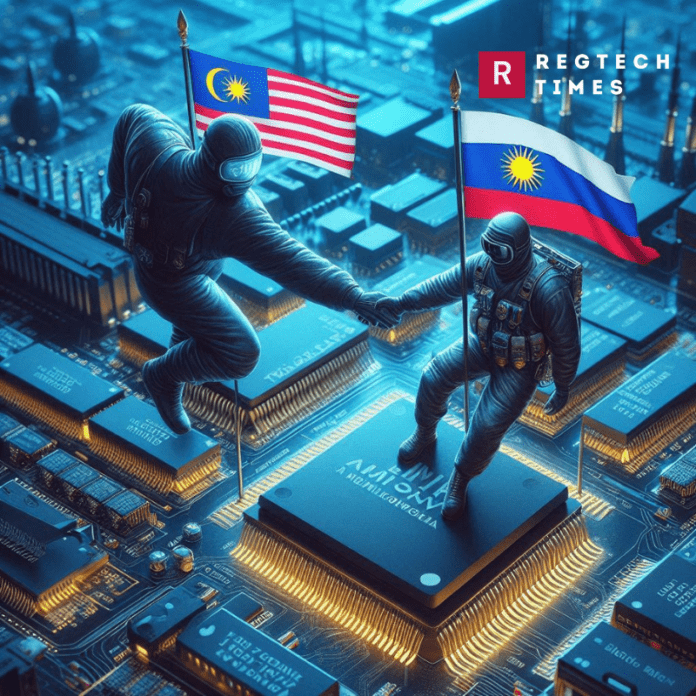The United States effort to cripple Russia’s war machine in Ukraine has ensnared an unlikely target far from Moscow: Malaysia’s multibillion-dollar semiconductor industry. At the centre of this controversy is Jatronics SDN BHD, a semiconductor maker based in Kuala Lumpur, Malaysia.
Jatronics is one of nearly 300 entities that Washington recently sanctioned over their alleged links to Russia’s military suppliers. This sanctioning has profound implications for the global semiconductor supply chain and raises questions about Malaysia’s geopolitical stance in the ongoing conflict.
The Sanctions On Jatronics
Jatronics, a prominent player in Malaysia’s semiconductor industry, stands accused of shipping electronic parts and components to Russia, which are crucial for sustaining Moscow’s military operations. The sanctions have effectively frozen any US assets held by the targeted entities and barred anyone under US jurisdiction from dealing with them, thus shutting them out of the US financial system.
US officials have not explicitly stated that components shipped by Jatronics have been directly used in military equipment. Jatronics supplied components to Russian companies integral to Russia’s military-industrial complex. These materials included Tier 1 items on the US Department of Commerce’s List of Common High-Priority Items, which are considered critical due to their role in the production of advanced Russian precision-guided weapons systems.
You May Like to Read the Order of US Sanction on Malaysia’s Jatronics
Russian Connections and Evidence
Russian customs data analyzed by the Center for Advanced Defense Studies (C4ADS) corroborates the US government’s claims. The data reveals dozens of shipments from Jatronics to companies in Russia, including OOO Planar and Design Center Kristal. These companies are known to have customers within Russia’s sprawling defence industry. OOO Planar, for instance, was sanctioned in March 2022 for its role in procuring foreign technology for Russia’s military programs, including military space programs.
Between April 2022 and September 2023, Jatronics made more than 50 deliveries to Russian companies, totaling over $3 million. The shipments included microchips, semiconductors, and silicon wafers—the raw materials essential for semiconductor manufacturing. According to C4ADS analyst Allen Maggard, microchips are particularly noteworthy due to their dual-use capabilities, meaning they can be used in both civilian and military applications. US-designed microchips, for instance, have been frequently found in Russian cruise missiles, fighter jets, and drones that have been intercepted or shot down.
You may like to read
China Defiantly Unfazed by AI Chip Sanctions Imposed by US, Sets Up $47.5 Billion Fund
Global Semiconductor Supply Chain
The sanctions come at a time when Malaysia is positioning itself as a major hub in the global semiconductor supply chain by touting its geopolitical “neutrality.” Malaysian Prime Minister Anwar Ibrahim, in a keynote address at the SEMICON Southeast Asia 2024 tech conference, pitched Malaysia as an ideal “neutral and non-aligned” host for semiconductor makers amid the US-China tech war. Anwar’s government aims to attract $100 billion in new investments, leveraging Malaysia’s strategic position and neutrality.
Malaysia’s Complicity in Enabling Iran’s Evasion of International Sanctions
However, this stance has made domestic companies like Jatronics vulnerable to international sanctions. In December, the US sanctioned four other Malaysian companies for allegedly helping to funnel drone parts to Iran, which Washington accuses of selling drones to Russia for use in Ukraine. Earlier this month, a senior US Treasury Department official visited Malaysia to highlight the sanctions risk posed by allowing Iranian oil and funds for terrorist groups to flow through the country.
Consequences and Future Outlook
The implications of the sanctions on Jatronics are significant. They not only isolate the company from the US financial system but also serve as a stern warning to other firms involved in similar activities. Malaysia’s neutral stance may serve it economically and politically by attracting foreign investors and pushing back on Western pressure. However, this also increases the risk of domestic companies being sanctioned.
Malaysia’s Bold Stand: Saifuddin Nasution Rejects US Sanctions, Aligns with Iran on Oil Policies
The Americans really believe that they can help the Ukrainians achieve their strategic ends if we can really stop the Russian global supply chains that are trying to evade sanctions, and Malaysia has proven to be an important cog in the Russian machine. The sanctions are intended not just to punish but to change behaviour, sending a clear message that selling to the Russians could result in losing access to US or European markets.
Despite these measures, Malaysian officials seem resolute in their stance. Commenting on a senior US Treasury Department official’s visit, the Malaysian government indicated that it prioritizes sanctions imposed by the United Nations over those applied by individual countries. This stance, while maintaining Malaysia’s geopolitical neutrality, might not insulate domestic companies from further international scrutiny and sanctions.
Jatronics SDN BHD’s involvement in Russia’s military supply chain is quite intricate. It is unexpected connections within the global semiconductor industry. As the United States intensifies its efforts to cut off supplies to Russia’s war machine, companies like Jatronics find themselves caught in the crossfire. This situation underscores the broader geopolitical complexities and the significant impact that international sanctions can have on global trade and industry. For Malaysia, balancing its ambitious economic goals with the realities of international politics will be a challenging but essential endeavour in the coming years.



